 Petzlover
Petzlover Both Exotic Shorthair and Ragamuffin are originated from United States. Both Exotic Shorthair and Ragamuffin are having almost same weight. Both Exotic Shorthair and Ragamuffin has almost same life span. Both Exotic Shorthair and Ragamuffin has same litter size. Exotic Shorthair requires Low Maintenance. But Ragamuffin requires Moderate Maintenance
Both Exotic Shorthair and Ragamuffin are originated from United States. Both Exotic Shorthair and Ragamuffin are having almost same weight. Both Exotic Shorthair and Ragamuffin has almost same life span. Both Exotic Shorthair and Ragamuffin has same litter size. Exotic Shorthair requires Low Maintenance. But Ragamuffin requires Moderate Maintenance
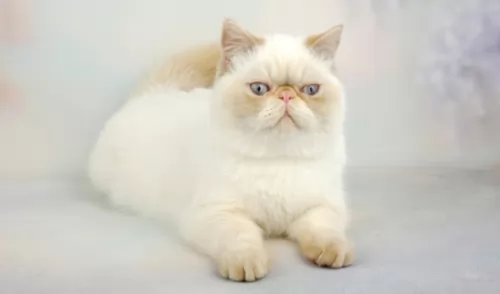 The Exotic Shorthair cat is such a sweet-faced cat that it is often referred to as the ‘lazy man’s Persian. This is because the face is also flat and pushed in like the Persian cat.
The Exotic Shorthair cat is such a sweet-faced cat that it is often referred to as the ‘lazy man’s Persian. This is because the face is also flat and pushed in like the Persian cat.
The Exotic Shorthair was in fact developed as a short-haired version of the Persian. It was in the 1950s that the Persian was used to mate with other breeds such as the Burmese.
The crossbreed gained recognition but some American Shorthair breeders produced a new breed standard that would disqualify American Shorthairs that showed any signs of crossbreeding.
It was in 1966 that the Cat Fanciers Association recognized the cat as a new breed and under the name Exotic Shorthair.
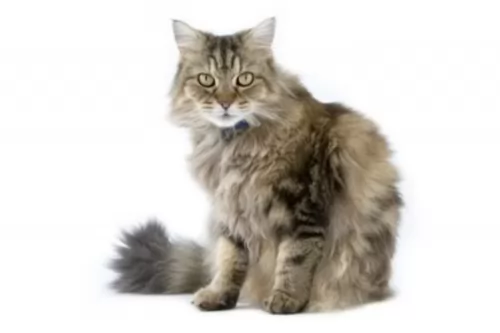 The beautiful Ragamuffin cat is a domestic feline that was established as a separate breed in 1994. It is a variant of the Ragdoll cat.
The beautiful Ragamuffin cat is a domestic feline that was established as a separate breed in 1994. It is a variant of the Ragdoll cat.
It was during the 1960s that a regular long-haired cat that was also white and non-pedigreed produced different litters of kittens, one of which was an unusually docile litter of kittens.
The history of the RagaMuffin can in fact be traced back to the founder of the Ragdoll cat breed, Ann Baker. Breeders working with Ann decided to create their own breed, the Ragamuffin, in 1994. It is a fairly new breed and the Ragamuffin has inherited quite a lot of the Ragdoll cat’s qualities. It arrived in the UK in 2009.
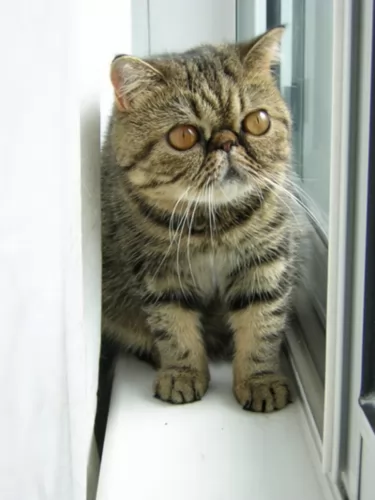 Developed through crosses between Persians and American Shorthairs as well as other cat breeds, the Exotic Shorthair looks like the Persian but he has a short coat.
Developed through crosses between Persians and American Shorthairs as well as other cat breeds, the Exotic Shorthair looks like the Persian but he has a short coat.
The coat is found in the same colors as the Persian cat – patterns and solid colors, ranging from chinchilla silver to tabby, tortoiseshell, black and white and bicolor. The eyes are large and round, the ears small and round and the tail fairly short and thick.
The Exotic Shorthair is a sweet, gentle, calm cat but a bit livelier than the Persian. They’re lively, friendly, and playful, but are also cats that like to sit in your lap and be stroked.
They get on well with children and other pets, being a loyal friend to the entire family. He quietly communicates with his human family with a soft voice. He is also quite adaptable to living conditions so long as his human family provides him with lots of attention.
He won’t want to be left for long periods of time on his own so he won’t suit living in a home where he is left alone all day.
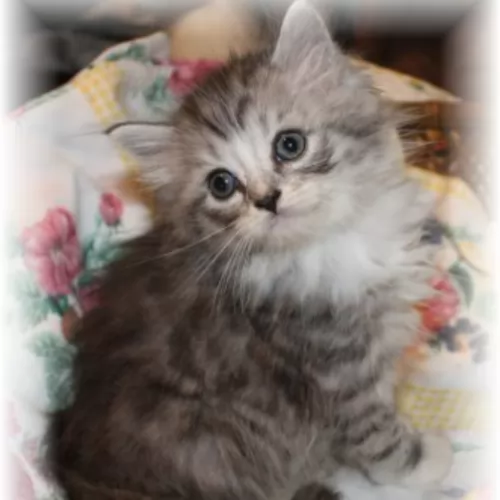 Ragamuffins are large, muscular cats and some of the larger ones can weigh up to 9kg.
Ragamuffins are large, muscular cats and some of the larger ones can weigh up to 9kg.
The chest of the cat is broad, he has a broad head and a well-plumed tail. These medium- to semi-longhaired cats have a thick, plush, silky coat with a ruff around the neck.
The coat is available in a number of colors and patterns, but popular colors are tabby with white, brown, blue and tortoiseshell. The nose of the Ragamuffin is shorter than that of the Ragdoll and the eyes are walnut-shaped. The eyes can be green, blue, or gold.
The Ragamuffin cat is a little bit more energetic than the Ragdoll and is a loving, loyal member of his human family. He is a large but docile cat. These cats are amicable, playful and also intelligent.
Many people train them to walk easily on a leash. They make great companions for single people or families.
Calm and unruffled, he makes the perfect family pet. People are always ready to make a fuss of them because of their beauty and they are always ready to lap up the attention. In fact, these big cats are so fond of attention from their owners that they don’t like being left alone for long periods of time.
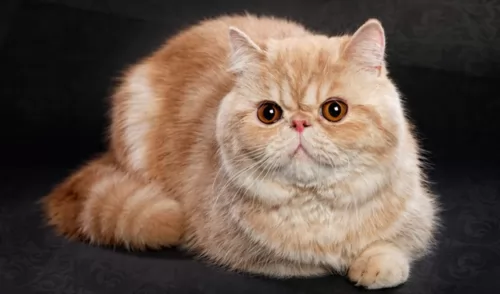 Your Exotic Shorthair is a loving cat and for those who prefer, it is a cat that is livelier than the Persian. While the Exotic Shorthair also has a mellow personality, because of its shorthair ancestors, it's more active.
Your Exotic Shorthair is a loving cat and for those who prefer, it is a cat that is livelier than the Persian. While the Exotic Shorthair also has a mellow personality, because of its shorthair ancestors, it's more active.
This Exotic cat can live to be 15, 16, or 17 if you care for him well and that means you have 15 years to share with a most wonderful feline companion.
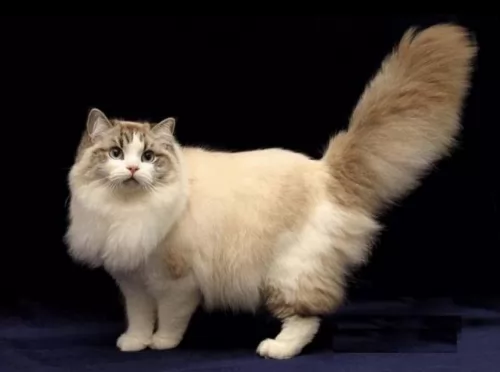 Your RagaMuffin promises to make you a splendid pet. He is such an amicable cat, being social and friendly with his human family.
Your RagaMuffin promises to make you a splendid pet. He is such an amicable cat, being social and friendly with his human family.
He also gets along with your visitors and any other pets you have in the house. Children love his playful, easy-going nature.
Having a Ragamuffin cat in your home is such a pleasure and this large cat is willing to go out of his way to be the perfect pet and companion for you.
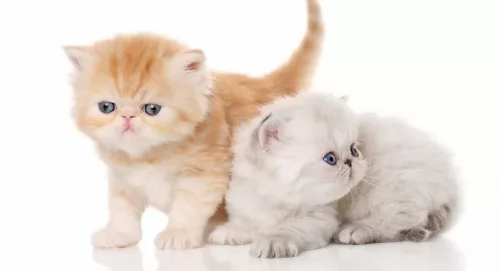 With the Exotic Shorthair, some of the diseases are genetic while others can be encouraged by poor diet and lifestyle.
With the Exotic Shorthair, some of the diseases are genetic while others can be encouraged by poor diet and lifestyle.
Obesity for instance is a major disease of cats and it contributes to many serious illnesses in cats. Excess weight shortens your cat’s life and contributes to arthritis and diabetes. The extra weight puts a strain on the cat's joints. Shedding just a little bit of weight can result in improved mobility.
Dental disease is a common chronic problem in pets. Make sure to check inside your cat’s mouth from time to time as serious dental problems can cause pain and interfere with the health of your cat’s important organs such as heart and kidneys.
All kinds of parasites can invade your Exotic Shorthair's body, internally and externally – worms, fleas, and ticks - and cause your pet a tremendous amount of pain and discomfort.
Brachycephalic Syndrome is a respiratory distress syndrome and it mostly affects what is known as brachycephalic cats – those cat with snub faces like the Exotic Shorthair.
The flattened features of the face make it that there is less space for the tissue to grow. The soft area at the back of the roof of the mouth hangs into the airway, obstructing it, and they can’t breathe normally. Sometimes the cats will require surgery to allow for more regular breathing.
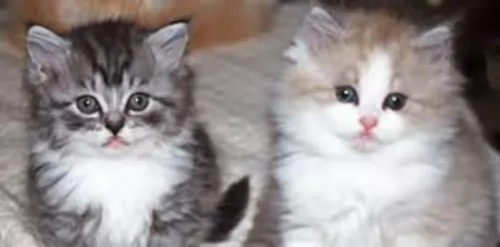 Ragamuffins are healthy cats with no known inherited diseases, but as with all cats you want to know something of the diseases that can plague cats.
Ragamuffins are healthy cats with no known inherited diseases, but as with all cats you want to know something of the diseases that can plague cats.
You’ll want to check that your Ragamuffin has been tested for Hypertrophic cardiomyopathy as well as Polycystic kidney disease.
This is a commonly diagnosed cardiac disease in cats. Feline Hypertrophic Cardiomyopathy causes the muscular walls of a cat's heart to thicken. The heart can no longer work sufficiently. It seems as though genetics plays a role as there are some cats that seem to battle with this disease more than others.
If you catch the disease early enough, the vet can devise a treatment plan to improve the cat’s quality of life.
Although you find this disease more frequently in Persian cats, this inherited disorder can be found in other cat breeds too. Liquid-filled sacs develop in the kidneys, growing in size and taking over kidney tissue which ultimately leads to kidney failure. Your cat will have nausea, vomiting, weight loss, and lethargy, and your cat will have to get to the vet.
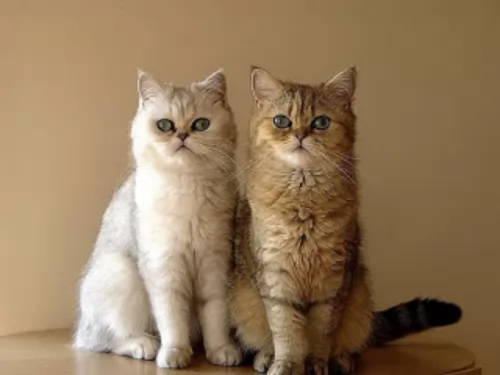 It is important to understand the type of foods available to your pet and how often and how much to feed him.
It is important to understand the type of foods available to your pet and how often and how much to feed him.
Most cats prefer to eat several small meals a day as opposed to a couple of large ones. Make feed times interesting and provide food puzzles to have your cat ‘prey’ for food.
Always read and understand the labels on the cat food packaging and be sure to always feed your Exotic Shorthair with the very best food there is and to follow the portion guides.
If you’re in any doubt or your cat doesn’t want to eat his food, try something else or speak to your vet about how to be sure your cat is getting fed the best food there is.
Make sure to have your kitten vaccinated as required. Also, when you take your kitten in to be vaccinated, the vet will also perform a check-up to make sure your kitten is healthy as these cats are susceptible to bacterial and viral infections.
Your cat has a short, low maintenance coat. A brush once a week can get rid of loose hairs and you and your cat will both enjoy the therapeutic bonding between the two of you.
Check your cat’s inner ears for wax and debris as well as for signs of any infection, and if you don’t want to do that, professional cat groomers can do it for you.
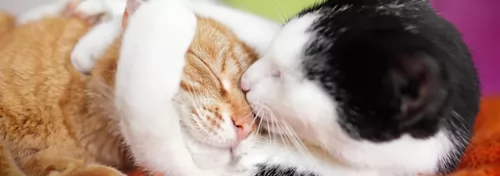 The Ragamuffin's longish coat will require some brushing at least once a week to keep it soft and silky.
The Ragamuffin's longish coat will require some brushing at least once a week to keep it soft and silky.
These are big cats so you will need to provide him with an adequate diet. He is a carnivore and will therefore require meat.
Kittens will eat 4 meals a day while the adult Ragamuffin can have 2 bowls of food. Cats can sometimes be fussy eaters so you want to be sure to give him what he likes from the wet and dry cat goods you get.
The better quality food he eats, the healthier he will be. Your Ragamuffin's dietary needs will also depend on his age.
He should never be without a constant supply of fresh, cool water.
If you have any questions about how to look after your Ragamuffin in the best possible way, speak to your local vet.